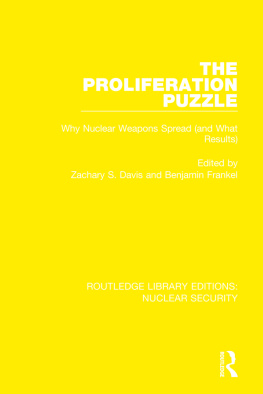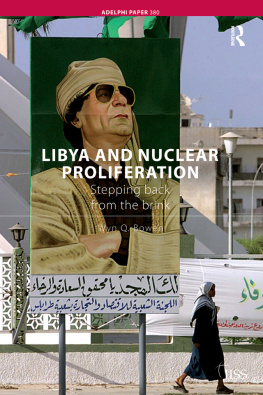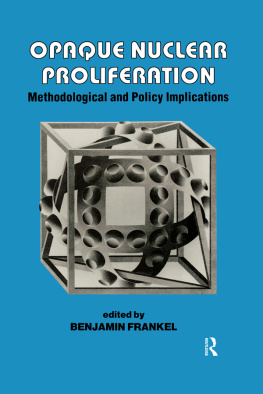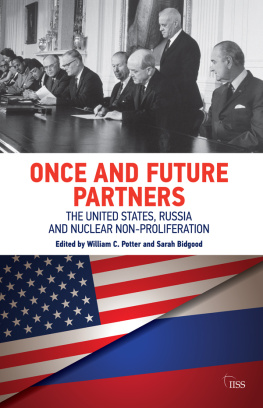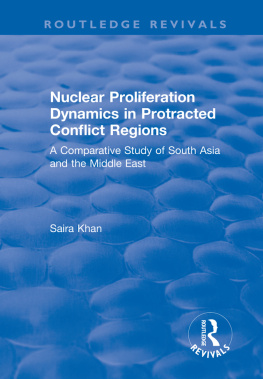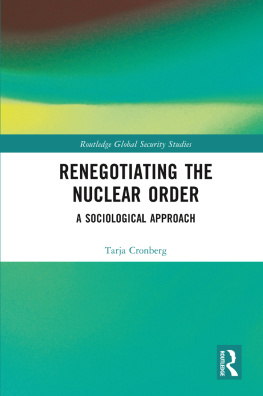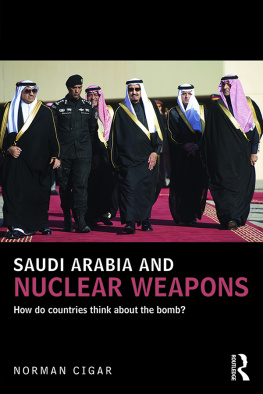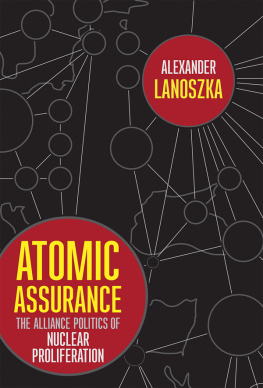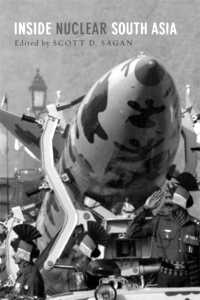ROUTLEDGE LIBRARY EDITIONS: NUCLEAR SECURITY
Volume 22
THE PROLIFERATION PUZZLE
First published in 1993 by Frank Cass
This edition first published in 2021
by Routledge
2 Park Square, Milton Park, Abingdon, Oxon OX14 4RN
and by Routledge
52 Vanderbilt Avenue, New York, NY 10017
Routledge is an imprint of the Taylor & Francis Group, an informa business
1993
All rights reserved. No part of this book may be reprinted or reproduced or utilised in any form or by any electronic, mechanical, or other means, now known or hereafter invented, including photocopying and recording, or in any information storage or retrieval system, without permission in writing from the publishers.
Trademark notice: Product or corporate names may be trademarks or registered trademarks, and are used only for identification and explanation without intent to infringe.
British Library Cataloguing in Publication Data
A catalogue record for this book is available from the British Library
ISBN: 978-0-367-50682-7 (Set)
ISBN: 978-1-00-309763-1 (Set) (ebk)
ISBN: 978-0-367-54353-2 (Volume 22) (hbk)
ISBN: 978-1-00-308908-7 (Volume 22) (ebk)
Publishers Note
The publisher has gone to great lengths to ensure the quality of this reprint but points out that some imperfections in the original copies may be apparent.
Disclaimer
The publisher has made every effort to trace copyright holders and would welcome correspondence from those they have been unable to trace.
THE PROLIFERATION PUZZLE
Why Nuclear Weapons Spread (and What Results)
Zachary S. Davis and Benjamin Frankel
Editors
First Published 1993 in Great Britain by
FRANK CASS AND COMPANY LIMITED
Gainsborough House, 11 Gainsborough Road,
London Ell IRS, England
and in the United States of America by
FRANK CASS
c/o International Specialized Book Services, Inc.,
5804 N.E. Hassalo Street,
Portland, OR 97213-3644
Copyright 1993
British Library Cataloguing in Publication Data
Proliferation Puzzle: Why Nuclear Weapons
Spread (and What Results). (Security
Studies Special Issue, ISSN 0963-6412)
I. Davis, Zachary S. II. Frankel, Benjamin III. Series
355.825119
ISBN 0-7146-4108-1
Library of Congress Cataloging-in-Publication Data
The proliferation puzzle : why nuclear weapons spread / edited by
Zachary S. Davis and Benjamin Frankel.
p. cm.
Includes bibliographical references.
ISBN 0-7146-4108-1 (pbk.) : $37.50 (U.S.)
1. Nuclear nonproliferation. I. Davis, Zachary S., 1955
II. Frankel, Benjamin, 1949
JX1974.73.P78 1993
327 74dc20
93-28873
CIP
This group of studies first appeared in a Special Issue on The Proliferation Puzzle: Why Nuclear Weapons Spread (and What Results) of Security Studies2, nos. 3/4 (Spring/Summer 1993).
All rights reserved. No part of this publication may be reproduced, stored in a retrieval system, or transmitted in any form, or by any means, electronic, mechanical, photocopying, recording, or otherwise, without the prior permission of Franks Cass and Company Limited.
Typeset by Regent Typesetting, London
Printed in Great Britain by Antony Rowe Ltd., Chippenham
Contents
Benjamin Frankel and Zachary S. Davis
Daniel Deudney
Benjamin Frankel
Zachary S. Davis
Richard K. Betts
Glenn Chafetz
Peter D. Feaver
Peter R. Lavoy
Avery Goldstein
Devin T. Hagerty
Dagobert L. Brito and Michael D. Intriligator
Bruce Bueno de Mesquita, James D. Morrow, and Samuel S.G. Wu
Richard T. Cupitt and William J. Long
Peter D. Zimmerman
Guide
Benjamin Frankel and Zachary S. Davis
THE RELATIONSHIP between theory and policymaking is not a subject either theoreticians or policymakers are eager to establish or nourish. Both sides realize there is a connection between the two, but they remain skeptical that closer links would benefit either. Theory builders in the social sciences are reluctant to make the necessary compromises and concessions involved in translating their neat theories into policy recommendations; policymakers view most theory as too vague and unspecific.
Theory, however, is essential to policy. There is no way to comprehend reality in any meaningful fashion without the aid of a theory. There are different approaches to reality, but the difference is not between one which is theoretical and one which is not. Rather, the difference is between an approach which is theory-conscious and one which is theory-innocent. The former is aware of the assumptions and presuppositions it brings to the analysis of reality; the latter keeps its assumptions hidden, unacknowledged, and unexamined. The assumptions and presuppositions which undergird our understanding of the world, however, are not less powerful because they are hidden. As Kenneth Waltz writes,
since empirical knowledge is potentially infinite in extent, without some guidance we can know neither what information to gather nor how to put it together so that it becomes comprehensible. If we could directly apprehend the world that interests us, we would have no need for theory. We cannot. One can find his way among infinite materials only with the guidance of theory.
We thus cannot approach reality unencumbered by a system of meaning we impose on it in order to make sense of it.
The proliferation of nuclear weapons is a good subject for social science theorizing, and such theorizing is especially opportune now. First, the sample, that is, the number of countries whose decisions about nuclear weapons we may want to study, is large. Some argue that it is difficult to theorize about the spread of nuclear weapons because only a few countries have acquired them. These scholars, however, overlook the fact that many more countries could have built nuclear weapons but decided not to do so. Because the decisions to acquire nr not to acquire nuclear weapons belong in the same domain, the understanding of why a certain state decided not to acquire nuclear weapons is helpful in understanding why another country chose to acquire them. Thus, rather than a sample of between five and nine states, the true weapons proliferation sample includes some forty states.
Second, the building of nuclear weapons is a complex task touching upon many of the subjects of study at the heart of social science and international relations. Nuclear weapons may be acquired as a hedge against external threat or for reasons of national prestige. They may also be built as a result of pressures by domestic coalitions among scientists, bureaucrats, and the military. They may be sought for defensive purposes or to support hegemonic aspirations. The destructiveness of these weapons and the short flight-time of their delivery vehicles raise questions about civilian command and control, especially in acute crisis situations. Further, because of their sheer destructiveness, nuclear weapons may blur the ready distinction between state-level characteristics and systemic effects.
Third, during the last two decades the building of nuclear weapons has been proscribed by the nonproliferation regime. The decisions countries have made about the acquisition of nuclear weapons can thus serve as a test of the effectiveness of this particular regime, and of regimes and regime theory in general.

